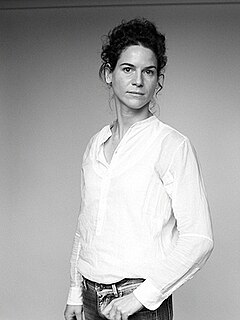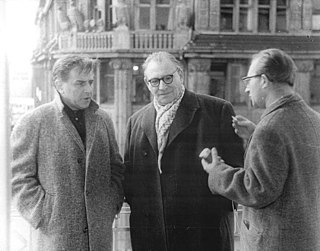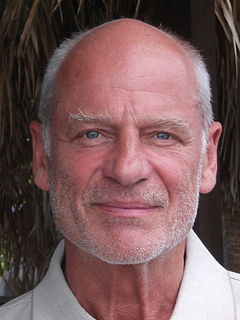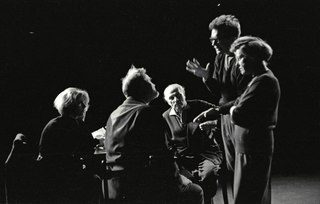
Elfriede Jelinek is an Austrian playwright and novelist. She is one of the most decorated authors writing in German today and was awarded the Nobel Prize in Literature in 2004 for her "musical flow of voices and counter-voices in novels and plays that, with extraordinary linguistic zeal, reveal the absurdity of society's clichés and their subjugating power". Next to Peter Handke and Botho Strauss she is considered to be the most important living playwright of the German language.

Bibiana Beglau is a German actress.

Johann Melchior Goeze was a Lutheran pastor and theologian during the period of Late Orthodoxy. From 1760 to 1770 he served as senior of Hamburg presiding as spiritual leader over the Lutheran state church of the city-state.
Igor Bauersima is a Swiss writer, director, architect and scenographer. From the late 1990 onward he became a prime mover of new German theater, pioneering the combination of live action and videoprojection in innovative ways, while firmly grounding his plays on philosophical concepts. He pays particular attention to issues relating to problems of morality, human identity, the individual and his relation to society. His work often addresses controversial subjects, either directly or by implication.

Karl Paryla (1905–1996) was an Austrian theater actor and director, and later a film maker as well. A lifelong, dedicated communist, his career in the Austrian theater was first interrupted by the Second World War, and then strained by Cold War politics. In the 1950s he began working in East Germany, where he performed as an actor and directed plays and films. An actor trained in the school of Constantin Stanislavski, he is praised for the realism he brought to his performances especially in Johann Nestroy's plays and for his ability to organize large ensembles dynamically on the stage. He is remembered also for his work ethic and his fervent belief in the emancipatory power of the theater.

Rüdiger Kuhlbrodt is a German film and theatre actor and director.

Klaus Zehelein is a German dramaturge. He was president of the Munich Bayerische Theaterakademie August Everding. Zehelein is also president of the association of German theatres, Deutscher Bühnenverein. For fifteen years, from 1991 until 2006, Zehelein was artistic director of the Staatsoper Stuttgart. Critic Gerhard Rohde, summing up Zehelein's theatre work at the Stuttgart opera, says "Zehelein does not view opera as a culinary phenomenon. For him opera is an extremely complex matter, where all arts – as well as social, philosophical, historic, utopic and other aspects – unite. This complexity of opera merits being perceived, being seen, being experienced; thus all works that end up performed on stage, are rigorously analyzed beforehand. He who says this results in thinned-out, merely sophisticated opera performances, missed out substantially in the Zehelein-Era in Stuttgart."

Samuel Finzi is a Bulgarian-German actor. Since his start in the late 1980s, he has hundreds of film, television, and theatrical credits. Between 1993 and 2011, he received ten acting awards.
Reinhild Hoffmann is a German choreographer and dancer who is an important innovator in Tanztheater, along with Pina Bausch and Susanne Linke.

Schauspielhaus Wien is a theatre in Vienna, Austria, located at 19 Porzellangasse in the 9th District of Vienna (Alsergrund).

Charles Lewinsky is a Swiss screenwriter and playwright, as well as a writer of novels and non-fiction, born and living in Zürich.
Gordon Kampe is a German composer and academic teacher.
Daniel Schiebeler was a German writer, poet, librettist and Protestant hymnwriter. He wrote librettos for operas and oratorios, set by composers such as Georg Philipp Telemann, Johann Adam Hiller and Carl Philipp Emanuel Bach.

Jean-Claude Zehnder is a Swiss organist in church and concert, harpsichordist, and musicologist. In research and playing, he is focused on Baroque music, and has played and recorded at historic organs in Europe. He led the department for organ at the Schola Cantorum Basiliensis from 1972 to 2006. His publications include books and music editions, such as organ works by Johann Sebastian Bach.

Werner Düggelin was a Swiss theatre director.
Alfred Kirchner is a German actor, theatre director and theatre manager who is based in Berlin. He worked at theatres such as Theater Bremen, Schauspielhaus Bochum, the Burgtheater in Vienna and the Staatliche Schauspielbühnen Berlin, before turning to freelance work. He has staged productions in Europe and North America, including several world premieres of both drama and opera. He directed the premiere of Martin Walser's Ein Kinderspiel in Stuttgart in 1971, the U.S. premiere of Henze's We Come to the River at the Santa Fe Opera in 1984, and the premiere of Hans Zender's Stephen Climax at the Oper Frankfurt in 1986. In 1994, he staged Wagner's Der Ring des Nibelungen at the Bayreuth Festival.
Andreas K. W. Meyer is a German dramaturge and journalist.
Semele is a singspiel libretto by Friedrich Schiller, first published in the Musen-Almanach Anthologie auf das Jahr 1782. Schiller edited a pirated edition in 1800, but decided not to republish it. After his death, his friend and patron Christian Gottfried Körner published the revised edition in the fifth volume of the series Theater von Schiller, published by Cotta-Verlag.

Saladin Schmitt, real name Joseph Anton Schmitt, also active under the pseudonym Harald Hoffmann) was a German theatre director.
Friedrich Schirmer is a German theatre director and dramaturge.












